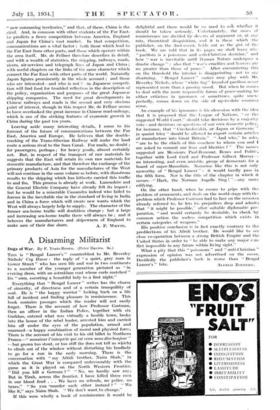Transport in the East
Communications in the Far East. By F. V. de Fenner. (P. S. King. 15s.) THE general thesis of this book is that, as communications are indispensable to economic development, and as the. Far East is about to be the theatre of greatest economic expansion in the world, the condition of communications in that area is second to none in importance. For this purpose, Mr. de Fenner, who is a member of the Faculty of Economics in the University of Budapest, has assembled the material of a most useful economic study. It is, on the whole, a fairly well- documented book. Few English authorities are quoted, and Mr. Feltner seems to have been somewhat hampered by lack of access to original sources, while some of his comments suggest that his local knowledge is imperfect. What he has done is to bring together a considerable volume of evidence, largely statistical, on a question which has not hitherto received all the attention it deserves : and the result is a volume which cannot fail, despite some defects, to be valuable to all students of the Far East.
Mr. de Fenner believes that " the centre of gravity of the economic forces of the world has shifted " from the Old World to the Pacific Ocean. Here he gives further currency to a notion already widely prevalent, but not founded on fact. The greater importance of the Far East has indeed altered the balance of political and economic forces ; but, despite this obvious factor which has been made the more prominent by the temporary impoverishment of Europe, the old Continent still remains the prime centre of the globe—a truth which cannot be too often proclaimed against the fashionable pro- phecies of the primacy of the other hemisphere. What Mr. de Fellner really means is that the immense increase in the productive capacity of the manufacturing nations since the War has thrown into high relief the need for what he calls " new consuming territories," and that, of these, Chins is the chief. And, in common with other students of the Far East, he predicts a fierce competition between America, England and Japan for China's vast market. In that competition, communications are a vital factor : both those which lead to the Far East from other parts, and those which operate within the area itself. Mr. de Fellner therefore describes in detail, and with a wealth of statistics, the shipping, railways, roads, rivers, air-services and telegraph lines of Japan and China ; with useful chapters on the links of the same character which connect the Far East with other parts of the world. Naturally Japan figures prominently in the whole account ; and those who are interested—and who is not ?—in Japanese competi- tion will find food for troubled reflection in the description of the policy, organization and purposes of the great Japanese shipping companies. The need for great developments in Chinese railways and roads is the second and very obvious point of interest, though in this respect Mr. de Fellner seems to have overlooked the great increase in Chinese road-mileage, which is one of the striking features of economic growth in China during the past ten years.
Leaving aside many interesting details, I come to his forecast of the future of communications between the Far East, America and Europe. He believes that the double- tracking of the Trans-Siberian Railway will make the land route a serious rival to the Suez Canal. For mails, no doubt ; for passengers, perhaps ; for heavy goods, almost certainly not. But, in respect of the transport of raw materials he suggests that the East will retain its own raw materials for domestic manufacture, and that therefore the exchange of the primary products of Asia for the manufactures of the West will not continue in the same volume as before, with disastrous results to the shipping which has hitherto carried this traffic to and fro. This process is already at work. Lancashire and the General Electric Company have already felt its impact : but he would be a miserable Cassandra indeed who failed to foresee in the inevitable rise in the standard of living in India and in China a force which will create new wants which the West will always largely help to supply. The character of the former sea-borne traffic will doubtless change ; but a large and increasing sea-borne traffic there will always be ; and it behoves the manufacturers and shipowners of England to
make sure of their due share. A. F. WHYTE.







































 Previous page
Previous page